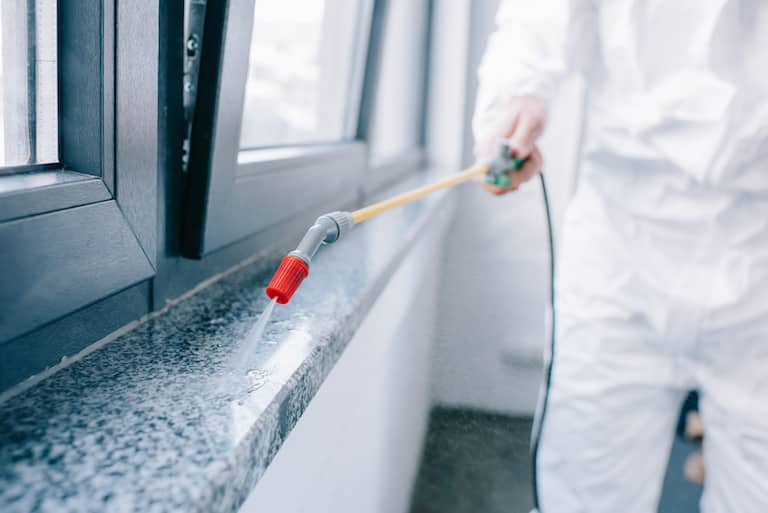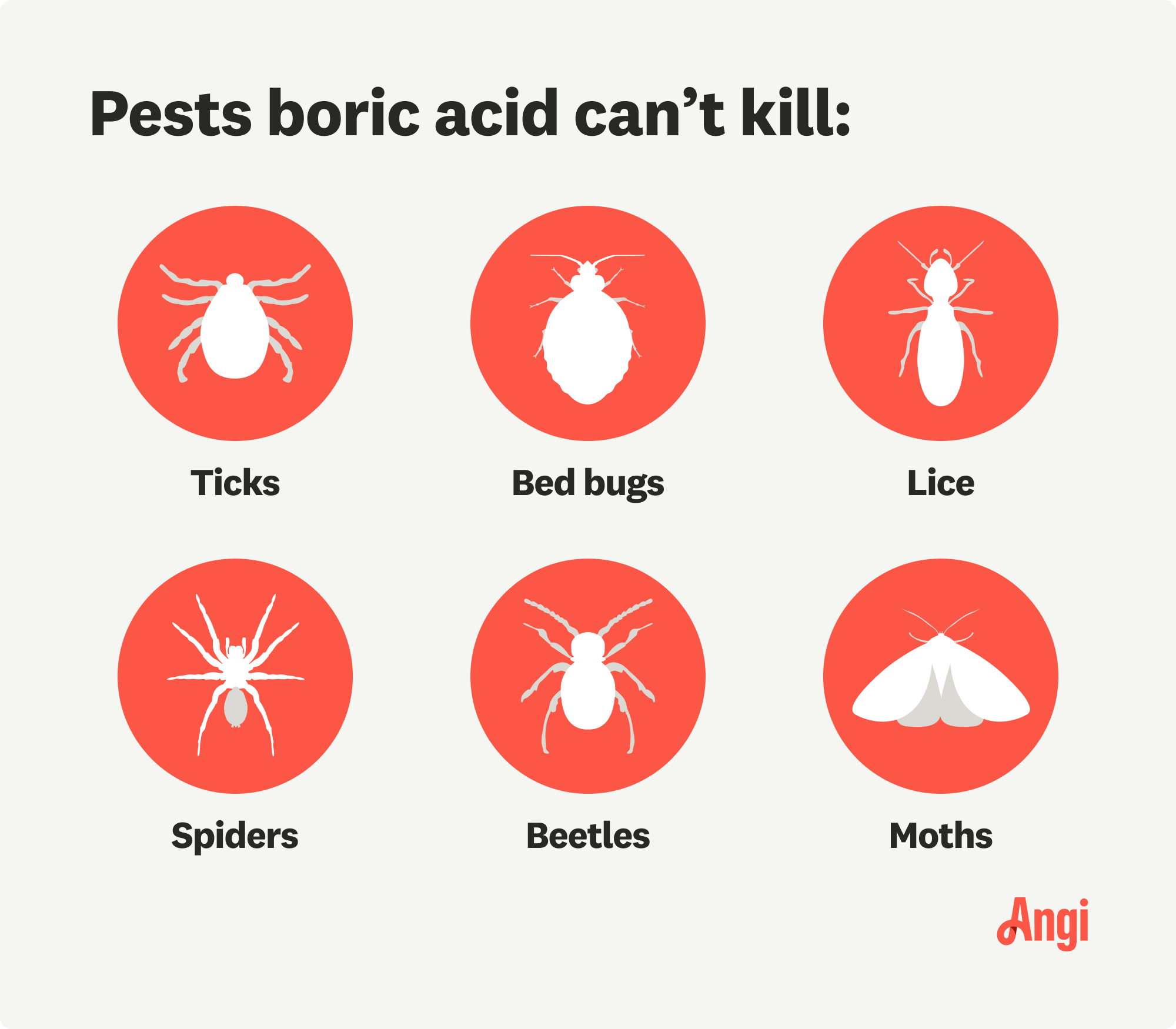
It’s important to know bed bug treatment costs if you have an infestation. Our guide covers different treatment methods and cost factors to eliminate these pests.
Pest control costs about $171, but ranges between $50 and $500 depending on the type of critter.


Pest control costs range from $50 to $500, with the national average around $171.
One-time pest control visits cost $300 to $550 on average, while monthly or quarterly plans may offer more budget-friendly maintenance options.
Bed bugs and termites are among the most expensive to exterminate, potentially costing thousands for fumigation.
Factors like home size, infestation severity, and treatment accessibility can significantly raise the final price of pest control services.
Pest control costs run about $171 on average, though the service can range between $50 and $500 depending on factors like the type of pest you're dealing with and the extent of the infestation.
Sometimes, cans of bug spray just won’t cut it. When you've got bugs, rodents, or common houseplant pests invading your home or garden, it's time to call in the pest control pros so you get rid of these unwanted housemates.
Pest control service doesn't have one-size-fits-all pricing. In fact, the local pest inspection specialist will likely come and give you a free quote based on their assessment of your property and pest problem. Take a look at a few of the key variables that impact how much you'll pay to obtain a critter-free home.
For most full-service pest control jobs, such as eliminating wasp or roach infestations in a 1,500-square-foot property, you'll pay between $200 and $600. But if you need a termite tent and fumigation, you could pay as much as $8,000.
Both services are generally one-time visits, but ongoing pest control services include treatment to keep ants, ticks, fleas, and termites at bay. Here are the U.S. national average costs for one-time and ongoing pest control:
| Number of Visits | Average Cost (1,500-Square-Foot Home) |
|---|---|
| One-time service | $300–$550 |
| Ongoing service initial visit | $150–$300 |
| Monthly pest control visit | $40–$70 |
| Quarterly pest control visit | $100–$300 |
| Annual pest control visit | $300–$550 |

Each type of pesky pest requires different labor and materials to help you bid them farewell, so each costs a different amount. For example, bed bugs can cost up to $6,000 (on the high end) to eliminate so you can sleep easy again, while eradicating ants typically costs $500 or less. Here are some average ranges for pest control costs by critter type.
Cost to exterminate ants: $100–$500
Cost to exterminate bed bugs: $1,000–$4,000
Cost to exterminate cockroaches: $100–$600
Cost to exterminate fleas: $100–$400
Cost to exterminate rodents: $180–$600
Cost to exterminate spiders: $100–$500
Cost to exterminate wasps: $300–$700
Cost to remove mosquitos: $350–$500
Cost to remove bats: $230–$700
Cost to remove beehives: $150–$500
Cost to eliminate termites: $250–$1,000
Cost to remove snakes: $130–$600
Cost to remove armadillos: $175–$500
Cost to remove gnats: $150–$250
Cost to remove spotted lanternfly: $200–$600
The type of treatment used for extermination can significantly impact costs. For example, chemical treatments tend to cost more than non-chemical treatments. Simple treatments using traps can cost under $100, while whole-home tent fumigation can reach upward of $2,500 or more.
Along with that, treatments for certain types of pests will cost more than others. Treating a small ant infestation costs anywhere from $100 to $500, while a major bedbug treatment can cost as much as $6,000.
Here’s a breakdown of pest control costs based on treatment type:
| Treatment Type | Description | Average Cost |
|---|---|---|
| Physical Traps | Easy to place and monitor around the house | $100–$600 |
| Chemical Sprays | Requires professional exterminator to apply correctly and safely | $100–$3,000 |
| Fumigation | Multi-day process that may require temporary evacuation | $1,500–$8,000 |
A single wasp nest or a small family of rats is pretty insignificant in terms of labor and cost. But if you have a major infestation of any type of pest, whether it's termites, bedbugs, rats, or ticks, the service will cost more. Larger infestations require more time, more materials, and often more visits, too, so the pest control company requires a more substantial payment to cover all their costs.
Here’s a breakdown of pest control costs based on size and severity of the infestation:
| Size and Severity | Cost Range |
|---|---|
| Small/Mild | $100–$500 |
| Moderate/Medium | $300–$700 |
| Large/Severe | $1,000–$8,000 |
More space in your home and yard means more square footage to cover, from the initial inspection to the treatment application. Whether your exterminator charges by the hour or by the square footage, this will equate to additional charges for pest control service. Here’s how you home size might affect your pest control costs:
| Home Size in Square Feet | Average Cost (One-Time Service) |
|---|---|
| 1,000 | $250–$450 |
| 1,500 | $300–$550 |
| 2,000 | $350–$600 |
| 2,500 | $400–$675 |
| 3,000 | $450–$750 |
| 3,500 | $500–$825 |
| 4,000 | $550–$900 |
Tipping isn't a required or standard part of pest control service costs, but it's a thoughtful way to show appreciation, especially if your technician goes above and beyond. Most homeowners don’t tip for routine treatments, but for one-time services, particularly those that involve difficult or dirty work (like attic or crawl space treatments), a $10 to $20 tip per technician is a kind and generous gesture. In lieu of cash, you can also choose to offer snacks, beverages, or bottled water instead.
While the core factors like infestation type, treatment method, and home size play a key role in determining your pest control pricing, several other cost variables could creep up on your final bill. Here are some lesser-known but important extras to consider.
Pest inspection fees cost between $125 and $450 on average. Some pest control companies offer free inspections, but others charge a standalone fee, especially for specialty pests like termites or bed bugs. However, this fee is sometimes waived or deducted from your final bill if you proceed with treatment.
How easy the problem area is to access will impact how long the service takes and, therefore, how much you'll pay. Here are some examples of various tasks, which ones tend to be more pricey, and why:
Cabinets and other easily accessible areas: Treatment for areas that are easy for the pest specialist to access tend to be less expensive because it will not take as much time to treat them.
Yards: Depending on the type of pests being removed from the yard, these jobs may be less costly because they aren’t as difficult to access as other areas. For instance, removing bees can cost as low as $75, but the average cost to remove a snake from your yard is at least $150.
Attics: Having pests or animals removed from an attic tends to be more expensive, and the cost can vary depending on what is taking up residence in the rafters. In fact, complex removals for multiple animals can run as high as $1,500.
Walls: Another tricky place to treat for pests is inside walls. Depending on the type and severity of the infestation, this service can get costly. For example, if the home needs to be fumigated for infestations, it can cost thousands of dollars.
Cars: Critters try to stay warm wherever they can, which means they can make a home inside of cars. Removing pests from cars is more costly because it can be time-consuming and even require specialized tools.
The average cost for pest control service varies, not just by pest type but also by location. Here are some average pest control costs around the country:
| Location | Average Cost | Price Range |
|---|---|---|
| Chicago | $165 | $130–$220 |
| Dallas | $165 | $90–$240 |
| Denver | $130 | $100–$175 |
| New York City | $255 | $160–$350 |
| Orlando | $150 | $95–$210 |
| Phoenix | $105 | $60–$155 |
| Sacramento | $105 | $60–$150 |
Aside from the cost of pest control treatment, you may need to budget for repairs to the damage the pests caused. Termite repair costs, for example, average about $1,000 to $3,000, depending on the extent and location of the damage. For other infestations, there may be drywall or flooring to replace, plus any tainted or infested personal belongings.
For serious infestations, you may also need to budget for follow-up or regular maintenance visits to ensure the pest problem doesn’t resurface. Talk to your pest control pro beforehand to find out what follow-up services they offer and at what price so there aren’t any surprises when the treatment is complete.
Most common pest infestations are concentrated around the home’s exterior, including the siding, roof, and framing. Infestations in attics, garages, and sheds make up over 20% of extermination visits combined. Only a very small portion of pest control visits take place in the home's living spaces.
While you can likely tackle a few non-biting ants or the occasional spider yourself, DIY pest control methods, such as bug bombs, are only partially effective for substantial infestations. Local pest control specialists have the ability to identify pests, apply safe and effective treatments, and prevent them from returning.
Effective pest control is a demanding task, so here's why hiring a pro is the best option:
Licensed specialists provide longer-lasting results than DIY methods.
Pros can identify the exact species of pest, enabling them to select the most effective treatment method.
They can locate and treat nests, colonies, and hidden entry points.
Pest control treatments require specialized equipment and professional products, which must be applied safely to avoid health risks.
Local companies offer follow-up visits and service guarantees to ensure pests don’t return.
Reputable exterminators warrant their work and can provide documentation of treatments if necessary.
Pros will address underlying causes and not just surface issues.
Even when you hire a pest control expert, there are several ways to minimize pest presence in your home:
Clean your floors regularly of crumbs and spills
Keep your countertops and surfaces free of debris
Seal gaps and cracks around windows, doors, and the foundation
Keep stored food in tightly sealed containers
Trim bushes, weeds, and tree limbs away from the house exterior
Empty trash cans frequently and use tight-fitting lids
Eliminate any areas of standing water or leaks
Most jobs require a pest control provider to eliminate unwanted pests that are damaging your most important asset—your home or business. We use pesticides safely and in accordance with the law.
Reducing your costs for pest control is all about preventing pests from becoming a problem in the first place. Still, when infestations inevitably happen, there are ways to stay budget-conscious. Here are some of the best ways to prevent pests and reduce pest control costs:
For minor infestations, consider DIY pest control solutions, such as sprays, traps, or poisonous baits.
Inspect your property regularly to identify potential attractants, entry points, and hiding spots.
If you’re seeking professional services, get at least three separate quotes and compare packages before you commit.
Consider ongoing pest control services to reduce costs per visit and keep future pests at bay.
Address your pest problem as quickly as possible to avoid it spreading into a more extensive (and expensive) issue.
The main difference between exterminators and pest control experts is their approach. Exterminators focus on removing the pests immediately, using measures as intense as the problem. On the other hand, pest control companies take a more holistic look at not just tackling the immediate problem but finding its source, using humane measures to remove the pests, and taking actions that prevent their re-entry into your home.
If you have a severe infestation needing immediate attention, like a potential termite problem, then you want an exterminator. Hiring a local exterminator often means leaving your home for the duration of the service because they use harsh chemicals. Altogether, that can mean a higher price tag than pest control.
Pest control services remove pests and block them off at the source so they don’t return. For example, if you have squirrels in the attic, they’ll do an investigation, multiple check-ins to set up and take down traps, and seal off the holes they’re entering through. If you have a less severe pest problem that could turn into a bigger problem down the line, a pest control service will take care of it.
Be prepared to discuss the type of pests you're noticing, including where you spot them and how frequently you see them.
Discuss treatment options with your pro and how they can meet your needs and budget.
Ask about instructions to minimize pest activity between treatments.
Talk through long-term solutions or ongoing maintenance plans, and learn how to repair any damage caused by pests.
Confirm what follow-up visits or guarantees are included.
Home is the most important place on earth, which is why Angi has helped more than 150 million homeowners transform their houses into homes they adore. To help homeowners with their next project, Angi provides readers with the most accurate cost data and upholds strict editorial standards. We’ve surveyed over 10,000 real Angi customers about their project costs to develop the pricing data you see, so you can make the best decisions for you and your home. We pair this data with research from reputable sources, including the U.S. Bureau of Labor Statistics, academic journals, market studies, and interviews with industry experts—all to ensure our prices reflect real-world projects.
Want to help us improve our cost data? Send us a recent project quote to [email protected]. Quotes and personal information will not be shared publicly.
From average costs to expert advice, get all the answers you need to get your job done.

It’s important to know bed bug treatment costs if you have an infestation. Our guide covers different treatment methods and cost factors to eliminate these pests.

Termite damage repair costs can vary greatly based on the damage severity and location. Learn more about the associated costs of this project with our guide.

Professional spider exterminator costs vary depending on the infestation size, visit frequency, and methods. Use this guide to budget for speedy spider removal.

Foxes are opportunistic scavengers, so you don’t want to give them an excuse to park on your property. Learn how to keep foxes away from your yard.

While ground bees play an important role in our environment, severe infestations can cause issues. Learn how you can get rid of ground bees with this guide.

Mouse droppings left in your home can harm your health. Learn how to clean mouse droppings and dispose of them safely using our complete guide.